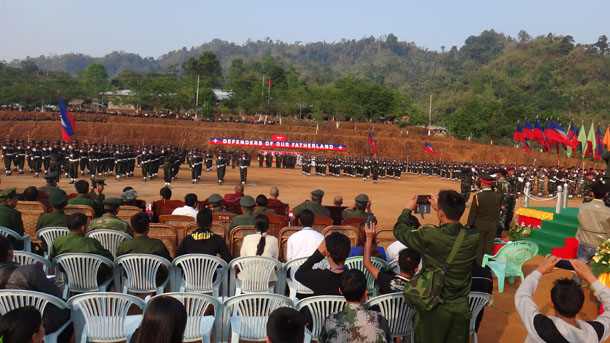RANGOON — The Arakan Army said it has clashed with government troops on more than 20 occasions since fighting broke out in Arakan State’s Kyauktaw Township on Sunday. At least one civilian was reportedly injured during ongoing fighting, according to a local relief group.
The Arakan Army (AA)’s Col Nyo Twan Awng said clashes had continued over four consecutive days near the Ram Chaung tributary in Kyauktaw Township, with several AA soldiers killed or wounded.
“Government soldiers are patrolling in the AA’s operating area and that’s why skirmishes broke out,” Nyo Twan Awng said. “We need to ask the government why they are using excessive military force to fight us.”
The AA colonel claimed at least 20 Burma Army troops had been killed, an assertion that could not be immediately verified by The Irrawaddy. Hla Thein, head of public relations for the Arakan State government, was contacted for comment but declined to be drawn on military matters.
The armed group also claimed government troops used mortars during attacks which first broke out near the Sittwe-Rangoon highway in Kyauktaw Township, northern Arakan State, on Sunday.
Tun Khin, a community leader in Kyauktaw Township, told The Irrawaddy on Wednesday that villagers in some conflict-affected areas of the township had fled their homes to escape fighting.
Maung Win of a Kyauktaw-based relief organization said a local of Thapyuchaung village, Maung Than Sein, sustained a bullet wound and was now being treated at Sittwe Hospital. Several local reporters have claimed that the victim was acting as a porter for the Burma Army at the time he was shot.
Burma Army troops clashed several times with Arakan Army forces in a number of areas in the western state beginning in late March.
The Arakan Army is also based in Laiza, Kachin State, where the Kachin Independence Army (KIA) is headquartered, and has been active in conflict areas where the KIA, the Ta’ang National Liberation Army (TNLA) and the Myanmar National Democratic Alliance Army (MNDAA) have clashed with government troops.
The government declined to allow the TNLA, AA and MNDAA to sign the so-called nationwide ceasefire agreement concluded in mid-October, while the KIA, alongside several other major ethnic armed groups, withheld its signature.

















